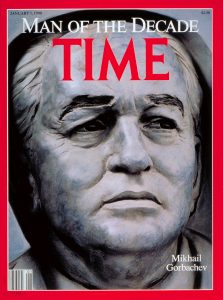Mikhail Gorbachev was the last leader of the Soviet Union. He became leader of the Communist Party in 1985 and held several other senior positions until his resignation in 1991. His leadership saw the introduction of anti-alcoholism policies. Perestroika and Glasnost were introduced, to promote both restructuring and openness. Gorbachev and the US President, Ronald Reagan, are credited with bringing the Cold War to an end. Some commentators suggest that Gorbachev was loved in the west and loathed and reviled within the Soviet Union.

Born in Southern Russia in 1931, Mikhail Gorbachev served as the last leader of the Soviet Union. The youngest member of the Politburo, he assumed the position of General Secretary of the Soviet Communist Party in 1985. He embarked upon a reform programme, Glasnost and Perestroika, in an attempt to modernise the USSR. As leader his changes saw the introduction of free elections, in which he was elected the first President of the Soviet Union.
Gorbachev’s policy of openness led to improved relations with the West. He met with US President Reagan on several occasions and is credited, with Reagan, as being responsible for the end of the Cold War.
Despite his work on Nuclear Disarmament and reforms, Gorbachev’s popularity within the Soviet Union was under threat. In August, 1991, he was challenged by senior party officials. For a few days he was placed under house arrest in his holiday home. Though he managed to regain his position, it was clear that the people wanted change and that power within Russia was now in the hands of the Russian leader, Boris Yeltsin, rather than himself and the Communist Party.
Gorbachev resigned his position as leader of the Soviet Union on 25th December 1991. Power was handed to the Russian Federation.
Gorbachev has remained active politically since his resignation as the leader of the Soviet Union. He stood, unsuccessfully, as a candidate in the 1996 Presidential election: won again by Boris Yeltsin.

credit: TimePix
Links
The Gorbachev Foundation – Official website of Mikhail Gorbachev’s charitable foundation.
BBC History – biography and video clips about Gorbachev’s rise and leadership.
The Guardian – interview with Mikhail Gorbachev in which he reflects on his time as Soviet leader and notes his mistakes whilst in office.
Biography.com – detailed biography.